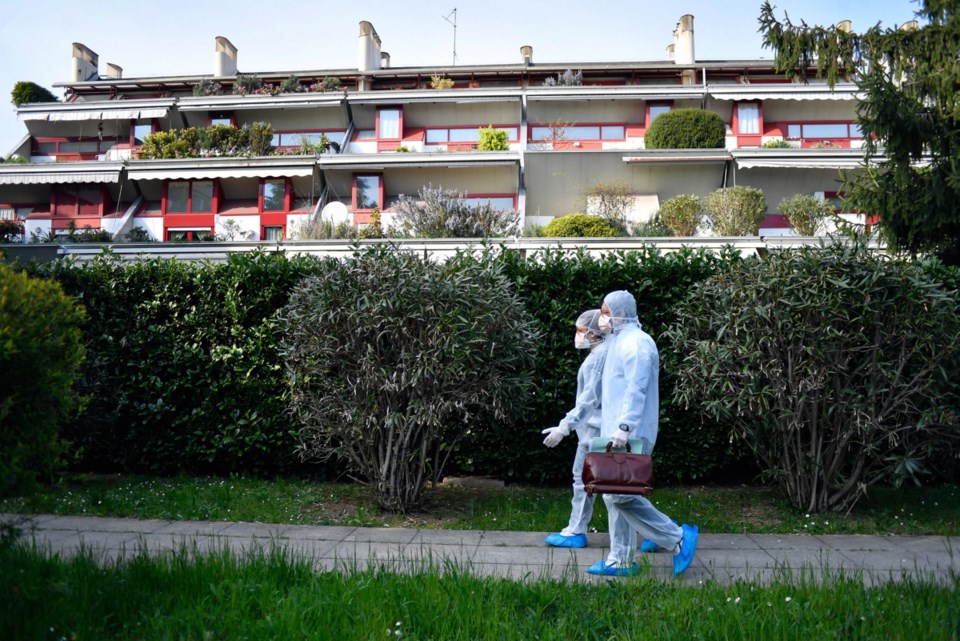The hard part about returning to Victoria after four months in Italy? Not being able to embrace their daughter when they got here.
They could see her. They could wave when she dropped groceries outside their house. But no touching, not during quarantine.
“We could not hug,” says Daria Dosselli. “That’s kind of sad.”
It’s a relief to be back, though. Dosselli, 59, and her husband, Gianfranco Mosca, 67, are safely back home in Cadboro Bay, which when we last met her seemed a remote possibility.
That was nine days ago, when she was still stuck in locked-down Padua, a city of 200,000 in hard-hit northern Italy, where she had gone to see her 90-year-old mother. Italy’s travel restrictions meant she couldn’t even see Mosca, who was trapped at his brother’s place in Turin. They had WestJet tickets back to Canada, but it didn’t look as though they would be able to get out before international flights were suspended.
But then the airline somehow found them room on its final plane out of Paris. Mosca rented a car (Italy’s rules allow travel that gets you home), picked up Dosselli and made a mad, 500-kilometre dash to Rome and an Alitalia connection to France.
Then came 26 hours in Paris’s all-but-deserted Charles de Gaulle Airport — the only food outlet still open was Marks and Spencer’s, selling sandwiches — where they holed up in a hotel, isolated. “We just sat in the room,” she says.
Last Friday, that final WestJet flight brought them to Calgary, one of four Canadian airports accepting landings from abroad. After some administrative checks — no, they didn’t have COVID symptoms — they flew to Victoria on a half-full plane on which everyone was carefully distanced. They were careful not to touch anything on the cab ride to their house.
Home is where they have remained — still symptom-free — for the past week, staring out the window at the trees. Their daughter, who had been living in the house, moved out to stay with friends. She comes by with food, which she leaves outside. Offers from friends to do the same are politely declined — after Italy, Dosselli and Mosca are super-serious about limiting opportunities for the virus to spread.
In fact, with Mosca having an unrelated health issue, they plan to continue their quarantine after their 14 days are up. “After the two weeks in which we don’t want to be the vehicle of contagion, he doesn’t want to be the subject of contagion,” Dosselli says.
The thing is, not everyone is as religious about breaking the chains of transmission. We’ve heard lots of stories about returning snowbirds, having crossed back into Canada, shopping at the liquor or grocery store on the way home.
Such tales are why Ottawa this week made a two-week quarantine mandatory for anyone — save for the likes of health-care workers and truckers — crossing into Canada. On Thursday, Justin Trudeau spoke of getting tougher on rule-breakers. Border agents will require travellers to sign documents promising to go straight into quarantine, no stopping. Even those showing no signs of COVID-19 will be subject to spot checks after re-entering Canada, with federal officials collaborating with local health authorities to ensure people are complying with the order to stay home. The Quarantine Act allows for penalties of jail time and fines of up to $750,000.
The Italian-raised Dosselli, who has lived in Victoria for almost 12 years, figures most Canadians will do the right thing anyway, penalties or not. “I like to think this is a country with a strong civic sense,” she says. “This is what Canadians do. This is why we chose Canada as our home.”
Meanwhile, other travellers still struggle to get back at all. That includes several Vancouver Islanders on the cruise ship Zaandam, which remains at sea after being denied entry to South America ports. Passengers, confined to their staterooms since Sunday, said Thursday that close to 150 people among the 1,243 passengers and 586 crew had come down with flu-like symptoms.
Metchosin’s David Kirkham, one of those on board, wrote that the Zaandam was to meet up with another Holland America vessel, the Rotterdam, off the coast of Panama on Thursday night for a ship-to-ship transfer of crew, medical staff and supplies. There was still no confirmation that the ship would be allowed to transit the Panama Canal and dock at Fort Lauderdale, Florida, on Monday, though.
For some people, quarantine at home sounds like a blessing.



